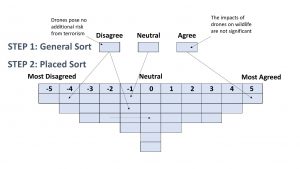The method finds groupings who give similar importance to similar topics rather than presuming that ‘local authorities’ (for example) are similar to each other. Five different groups were identified through the analysis which were termed: (i) what’s the question?; (ii) drone advocates; (iii) drones are a problem; (iv) drones are coming – do it right; and (v) it’s just the details. Some critical differences between groups were identified that need to be overcome to generate consensus on the way forward, such as “should we ask the public to decide if drones for logistics are desirable?”. Other issues which can be seen as a problem generally have broad agreement. For example, all groups accepted that environmental impacts such as noise pollution and battery production need to be addressed.

Smith A, Marsden G and Dickinson J (2022) Shaping the role of drones in UK logistics. In: Experimentation for Sustainable Transport? Risks, Strengths, and Governance Implications [Oldbury K, Isaksson K, Marsden G (eds)], Boxholm, Sweden: Linnefors Förlag.
Shaping the role of drones in UK logistics